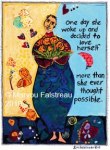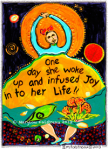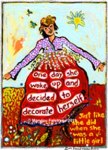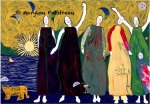
Written by Sen on May 5th, 2013 http://www.calmdownmind.com/finding-balance/
In a state of “low awareness” the tendency of a being is to be unconsciously imbalanced (in varying degrees), however, as one’s awareness starts growing/evolving the natural pull, or pressure, is towards finding conscious balance – it becomes inevitable. The state of low-awareness is also what I call the state of “unconsciousness” – which is similar to the state of being in sleep, where you are lost to the vagaries of any dream that you get involved with, in a completely reactive manner.
The state of higher-awareness is also what I call the state of being “conscious” where you are no longer lost to the dream, rather you understand what’s really going on – in this state you are involved with the dream but in a state of “aware intelligence”; the dream doesn’t stop but you are no longer lost to it, you are no longer in a state of delusion. Your higher-awareness brings an intelligence of its own, and this is what I call “aware intelligence”, which is also what allows you to no longer behave like a “reactive” being, rather you become a conscious being who now has the choice to stay in a state of balance and thus have a balanced experience of life.
What does “awareness” really mean?
Different teachings (spiritual or otherwise) use the term “awareness” in different contexts. I use the term “awareness” to imply the capacity for “observation” and sensitivity. So when I say “low awareness”, I mean a state where a being has a lower capacity to observe/introspect and a lower sensitivity. At a human-body level, you can imagine how a kid usually has “low awareness” and is mostly pre-occupied with his toys and candies, he’s not really bothered about what’s going on in the world, and he’s also not very sensitive towards how his behavior affects others (of course, there are some kids who are highly sensitive from the onset). As this kid starts aging his awareness also starts growing in many ways, this can be attributed to the growth in the brain’s capacity as well as more exposure to the outside world. So, the capacity for awareness can be defined purely at the “brain level”, however, that’s not the complete picture because awareness is also an attribute/capacity in you as being/soul, it’s not just an attribute of the body/brain alone.
A soul also has its “age”, starting from the time of its creation – infant soul, kid soul, young soul, mature soul and old soul, may be terms used to categorize some general phases of development of a soul. The infant soul has the lowest level of awareness, just birthed into life and hence low on experience and exploration (just like a new born human kid). An old soul has a very high level of awareness, and when an old soul incarnates into a human form, he/she has the tendency to be highly sensitive while also being highly wise/mature towards the worldly ways, along with a highly developed ability to sense non-physical aspects (like being a profound psychic).
The only reason why I mention “soul age” is to clarify that your level of awareness does not just depend on your human body/brain, but also depends on how old you are as a soul. Of course, if you are someone who doesn’t want to bother with concepts of soul/spirituality, then you don’t have “believe” in all this – it’s just that this understanding resonates with me, I am not trying to hold on to these understandings as a “belief”, I am okay with none of this being true. So, if you want to see yourself purely as a human body, and the idea of being a soul doesn’t really resonate with you, that’s fine too, as long as you understand that “awareness” is simply the capacity to observe, introspect and be sensitive – it’s a capacity which has the potential to keep growing as a part of your evolution.
For those who can resonate with the aspect of being a soul, in a human body, you can see your “awareness” as the capacity that you have developed through your life-time as a soul, along with the capacity in your current human brain. Usually souls choose compatible human bodies – so, if you are a soul with higher awareness you are likely to choose a human body which has a brain with a higher capacity for awareness. For example, if you are a mature soul you are less likely to choose a body which has a certain brain disability that incapacitates it to have a capacity for higher reasoning/introspection, you will choose a body with a brain that’s suited to your current level of awareness as a soul, so that you can live from your full potential and grow further from there. However, it’s also true that the level of awareness, in a soul, is the deciding factor – a soul with a higher awareness can bring this capacity into the human body/brain. This explains why some kids are highly mature, and display high sensitivity, from a very early age (even when the brain is yet to be fully developed).
Inner freedom is required to handle higher-awareness
When you start growing in awareness you are bound to feel dis-oriented, fearful and inundated by questions (about life or about yourself), for a while. In fact, the growth in awareness also causes you to become aware of all the suppressed emotions, become highly sensitive to outside reactions, become keenly aware of your mind/thinking (and the various movements of thought), become deeply aware of the imbalances around you (and in you), become aware of the nature of life (especially its dark aspects, which you were avoiding till now) and become aware of the “reality” in everything.
It can be quite a staggering process in itself, though it’s a positive process, and a natural process – it’s simply the natural growth/evolution in you as a being. The reason why people feel fearful, and confused, as they move into higher awareness, is because they lack an understanding of what’s really going on, and also because they are yet to develop the “space of inner freedom” to really allow all the past imbalances to be released for an alignment with balance. In this sense, one has to find inner freedom in order to handle the dynamics of higher-awareness living – without this space of inner freedom one is bound to have a hard time dealing with the flux instigated by this growth of awareness.
Inner freedom simply refers to the capacity, in you, to be “independent” of all influences. At a root level there are just two influences – emotions and thoughts. Of course, emotions are triggered by thoughts, and thoughts are triggered by certain emotions, and hence thoughts and emotions are simply inter-linked. In this sense, inner freedom is the capacity to be free of the “cyclic” influence of emotions and thoughts – it’s not about wanting to get rid of emotions/thoughts, it’s about having the freedom to allow them to “be”, without succumbing to the pressure of their influences, this is how you can “release” the past momentum. Eventually, in this state of openness, as the release keeps happening, you will observe that the emotions and mind-pull start losing their intensity, and thus their influence on you – you will experience that you can be “sensitive” without being pulled around by your sensitivity, you can be thoughtful without being pulled around by thoughts, and thus your motivations are rooted purely in “wisdom” rather than being rooted in the imbalanced pull of emotions/thoughts. You can imagine what a different state of living this is compared to the state of being at the mercy of emotions/mind.
Initially, the pursuit of inner freedom can feel like a real effort, it can feel like a huge challenge, because you are so mired in the pull of emotions/thoughts, and this pull has a strong momentum within you. For a while, you have to go through the “detox phase” (or phase of release) where you simply stay in a space of total allowing, or just a conscious openness, to everything that arises in you, in all its intensity, without trying to sort it out, without trying to find an escape, without trying to seek “relief” – it’s a challenge to be in this state of openness, but eventually this is what is required to really allow a full release of the past momentum of the accumulated imbalance. I talk about this is, in detail, in the post – The Phase of Release.
Higher-awareness gets you in touch with reality
In order to ride through the phase of release you need to have the “attitude” of inner freedom (read the post – The Attitude Required for Inner freedom). Quite simply, it’s about having the attitude of not wanting to cling to any form of assurance, or understanding, or belief, or trust, or hope, or certainty – the courage to simply allow everything that arises, without trying to sort it out through your “reasoning”. Once you develop the capacity for inner freedom you can use your “reasoning”, and introspection abilities, to resolve some inner conflicts, or confusions, gain a deeper understanding about life, develop the mindset of balance, and live from a place of objective/practical wisdom. When you seek understanding from a place of inner freedom you are more likely to find clear perspectives (or reality-oriented perspectives), rather than holding on to deluded perspectives, on life. This is why I would always emphasize on finding inner freedom first, before you venture into satiating your need for understanding aspects of life/living. Your reasoning abilities are highly balanced, and wisdom-based, when you are operating from the foundation of inner freedom.
When you lack inner freedom you are likely to keep looking for ways to satiate your need for “quick relief”, and thus would be wary of seeing “reality” in any situation, and would prefer holding on to certain delusions (like some blind belief that you find security in). Eventually, higher awareness is unavoidable, and hence seeing through all forms of delusions is unavoidable, no matter how desperately you try to cling to them – there is really no hiding, as your awareness keeps growing you can’t hold on to even a speck of delusion or imbalanced behavior. Everything, within you, get touched by this awareness and is brought to its state of balance, after which you start living the “expression” of your inner balance in your work, in your relationships and your life-style per se (of course, there is no universal standard for the life-style that a balanced person “should” lead – it’s a personal deal).
In the beginning of this post, I mentioned that if you don’t find resonance, with the discussion of soul/spirituality, it’s “fine”, but the truth is that you will, unavoidably, see yourself being moved towards understanding life more deeply – you can’t simply hold on to a narrow view, just because you find it convenient. You can’t avoid/ignore the push within you, triggered by your higher awareness, to understand life at a deeper level. It’s not my belief, it’s just my knowing, that who we are is “non-physical”, this physical body is simply a vehicle we are involved with to have the experience of physicality (for enjoyment and growth) – to understand the “spirit” nature (or non-physical nature) of who we are is what true spirituality is, and to understand the aspects of physicality is what objectivity/practicality is, one has to integrate the two in order to have a balanced physical life. Spirituality is not about living some idealized “spiritual lifestyle”, life-styles are individual choices, some prefer to be a hermit while some prefer to be a playboy model – spirituality is simply about understanding the non-physical aspect of you, to know yourself as deeper than just the body, it’s a part of self-realization. Of course, the foundation of inner freedom is primary, without this foundation one can easily make spirituality (or any understanding) into some form of a crutch to hold on to, which is no different from how a drug addict clings to his drugs.
If you are too attached to your physicality, and ignorant of your non-physical nature, you are bound to feel the suffering created by this lack of connection with the “reality” of who you are. Just because a teaching makes you feel “uncomfortable” doesn’t mean that you can simply discard it, you have to be open to sensing if your discomfort is coming from a place of “fear” where you afraid of facing a certain reality which something within you already “knows” to be true. Sometimes I get emails from people stating – “this concept of xyz, in your blog, doesn’t resonate with me, can I just let it go?” – and my answer would be – “Sure, but also remember that just because something doesn’t resonate with you doesn’t mean that it’s not true, it’s very possible that you are currently in a state of low-awareness/imbalance and hence the truth doesn’t resonate with you. You can try to let it go, but if it’s a part of reality it’s bound to keep coming up, until you are open to exploring it within you. You can’t escape reality”. The pointer of – “follow what resonates with you” – is only true for people who are willing to be authentic with themselves, who have a willingness to find truth (above just seeking a temporary relief), who have the inner freedom to align with reality instead of wanting a delusion. I cannot give the pointer of – “follow what resonates with you” – to a person who is imbalanced (with low-awareness), because such a person is not really in touch with his/her wisdom neither does he/she have the inner freedom to be willing to see reality in its true form.
When balance becomes a choice
Balance is not a choice in the state of low-awareness because there is no conscious freedom in such a state of living – one purely lives in a reactive manner, pulled around by the forces of influence, be it emotional or mental, be it from within or from outside. In order to find balance one needs to have a higher-awareness and a space of inner freedom. If you only have higher-awareness but lack “inner freedom”, you still lack a choice, you are still reactive, it’s just that you are highly aware of your reactions now. When you come to a place of inner freedom, you are no longer resisting the dark nature aspects of life and you are no longer overly clinging to the light nature aspects of life, and hence you have the perfect foundation to find balance, consciously.
To summarize, when you move from a state of low-awareness to a state of higher-awareness (usually triggered by sensitivity towards the suffering created by your inner imbalances), you will have a sense of “higher negativity” for a while (owing to your keen awareness of the imbalances – it feels like seeing everything through a magnifying glass) until you move towards finding inner freedom, and once you do that you can have the choice of working from a mindset of balance, mostly through becoming aligned with the reality of life (the reality that life has a light and dark nature, and both these aspects need to be accepted equally without resistance, or over-identification, with either). This mindset of balance constitutes the experience of inner wholeness. Without the space of inner freedom you don’t really have a choice towards exercising the mindset of balance. You can see how higher-awareness, inner freedom and inner/external balance are all inter-linked, and are all part of the required growth in a being towards higher maturity.
The experience of finding balance starts with the triggering of higher-awareness in you (through a wake-up call). After that, the journey is inevitable. Once higher awareness is triggered you can’t go back to the state of low-awareness, there is no possible way to “regress” – though some people do try their best to somehow go back to the old-state of low-awareness, by trying to numb themselves in some way (through food, alcohol, drugs, spiritual entertainment, material entertainment etc), it’s all eventually futile because it’s not possible to suppress your growing awareness.
Evolution is a forward movement, growth is a forward movement, life is a forward movement, there is no possibility of regression, there is only a possibility of temporary suppression which can at best cause some temporary delay, nothing more. Of course, it’s very normal to want to go back to the familiar domain of the old-state of low-awareness, because we find security in familiarity, and the state of higher-awareness feels like a highly unfamiliar domain. And it’s natural to keep fighting this growth of awareness, thinking it to be something “negative”, until you either get tired of fighting it, or you gain an understanding about what’s really going on and see that it’s not something negative, it’s just a part of normal/natural growth in you as a being.
Embracing your inner aloneness
Everyone eventually does need to go through this transition from low-awareness to higher-awareness, from unconscious imbalance to conscious balance – it’s just that each of us is an individual soul, and have individual journeys to ply. In one sense, you are totally alone in that no-one can live your journey, only you can. Also, no-one can completely understand what you are going through, not 100%, only you can. It’s important to embrace this reality of “inner aloneness”, even if it frightens you to sense this aloneness in you – once you embrace it, it becomes your strength, it becomes a part of your inner freedom, where you are no longer looking to the outside to act as a “crutch” for your balance.
Of course, you do need to work with the “outside”, your co-operation is required for the collective harmony, and you also need the co-operation of others in your life in order to function to your best potential – however, without having a space of inner freedom you can’t deal with the outside in an efficient and wise manner, you will either feel constantly threatened by the outside or feel overly dependent on the outside (making you feel helpless and also repulsive, to the outside, due to your dependent/needy behavior). Finding balance implies that you embrace the reality of your “inner aloneness” (the fact that you are an independent/individual being) along with the reality that you are part of the collective life – some people get too lost to the “outside”, while some people try to detach completely from the outside, both these states are rooted in imbalance.






